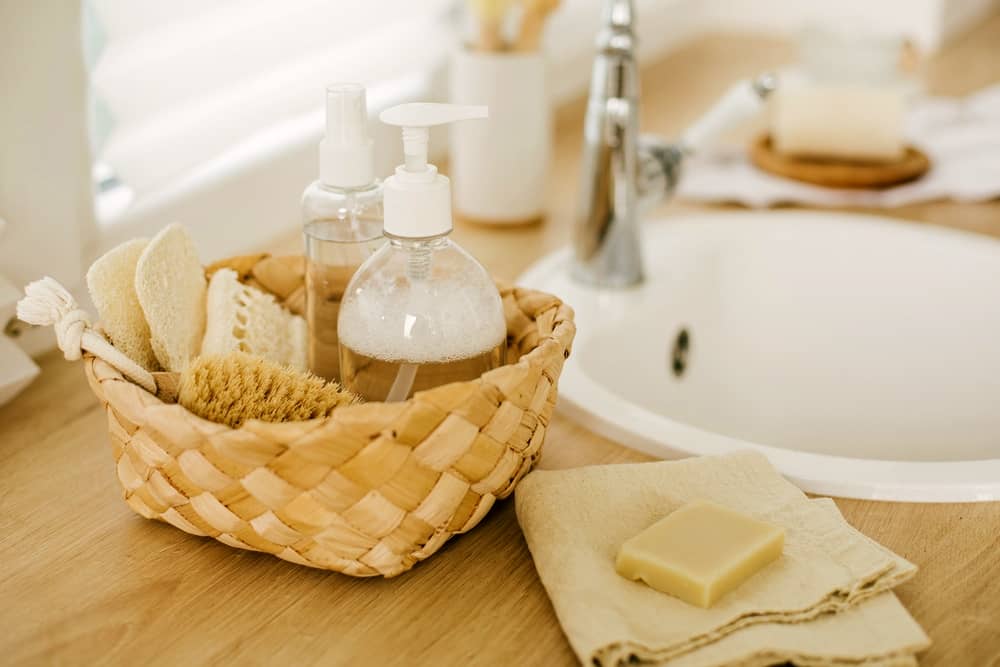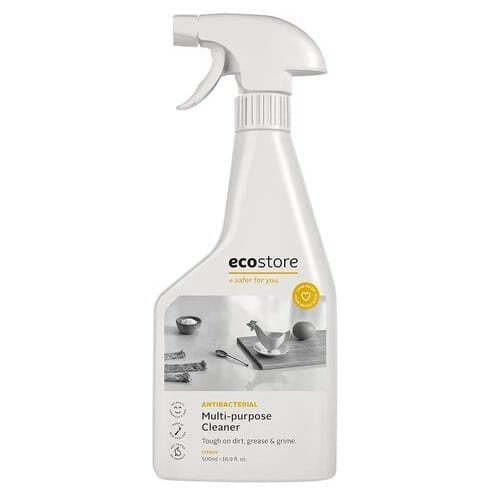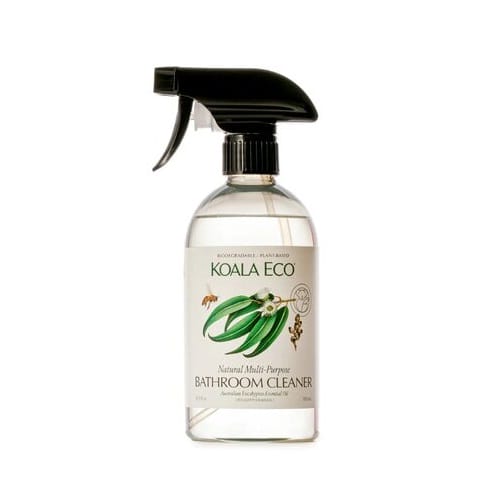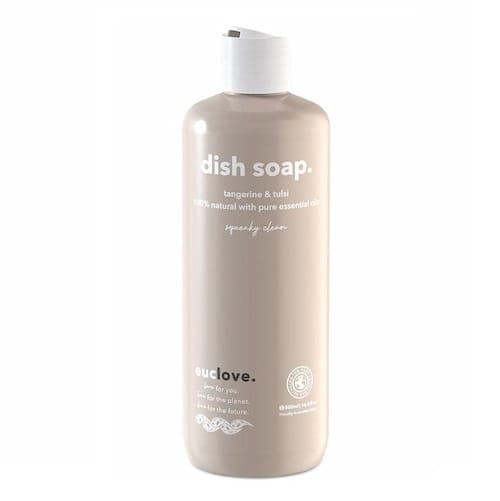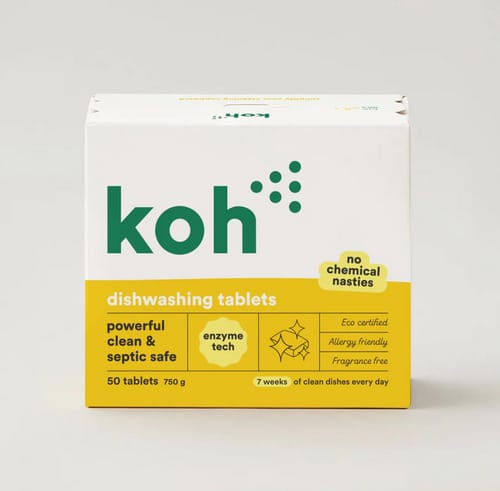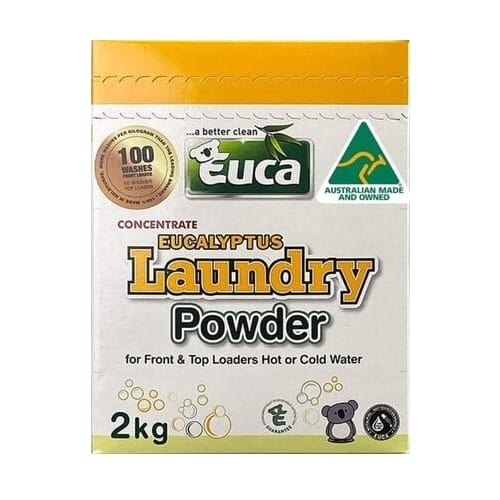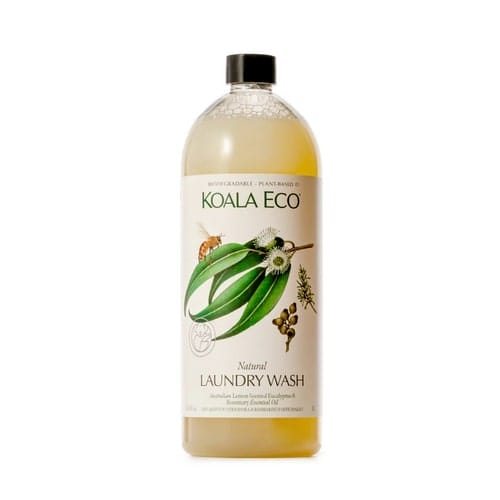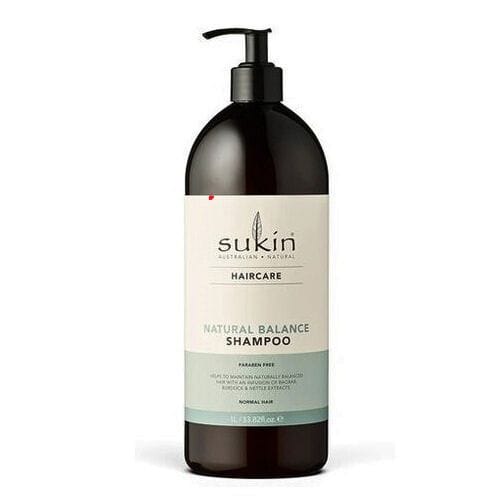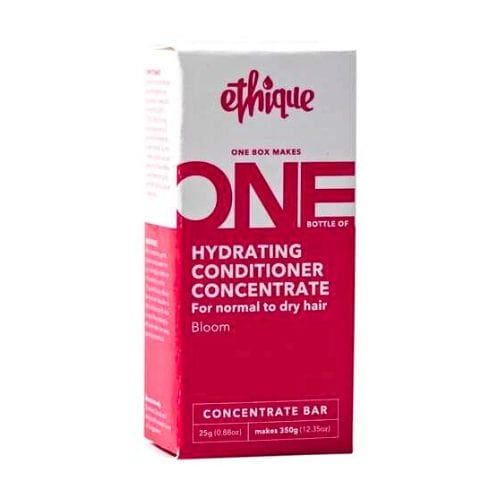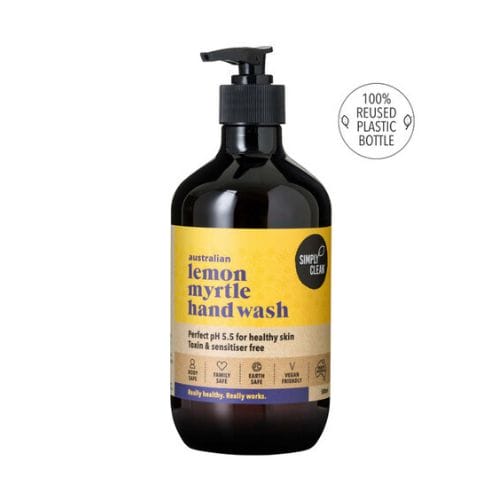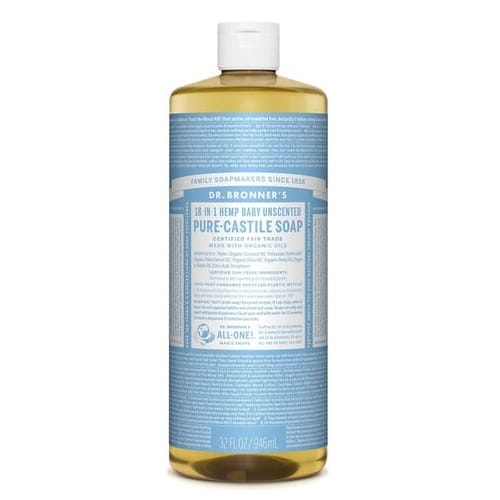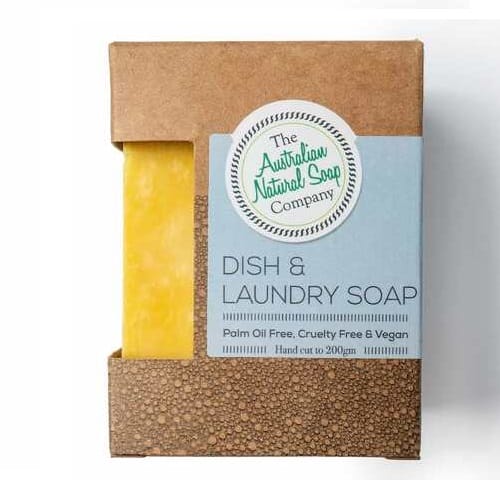As more and more of us transition into eco-friendly and nature-based lifestyles, there’s one aspect we should consider: are our cleaning products greywater safe?
Individual environmental responsibility isn’t just about reducing plastic use and limiting animal-based foods. We also need to think about our water consumption and how we can recycle water or use safer products that get rinsed down the drain.
If you’re looking for greywater-safe products in Australia, you’ve come to the right place! Here’s our round-up of cleaning products, from all-purpose cleaners to liquid soaps.
All-Purpose Cleaner | Bathroom Cleaner | Dishwasher Detergent | Dishwasher Tablets | Washing Powder | Laundry Detergent | Shampoo | Conditioner | Hand Wash | Liquid Soap | Bar Soap | What Not to Put In Greywater Systems | Are These Products Greywater Safe?
What is Greywater?
Greywater or grey water is the waste water that comes from all sorts of places in your home: showers, baths, washing machines, laundry tubs, dishwashers, and sinks.
It does not include water from your toilets – that’s blackwater, which contains raw sewage and other contaminants.
Fun fact: the average person uses almost 100 litres of grey water in a day! Approximately 2/3 of all water consumed in a household is grey water.
What Does “Greywater Safe” Mean?
If a product is labelled “greywater safe,” that means it does not contain chemicals and substances that will contaminate a grey water system or storage.
You can then use the grey water for gardening or your toilet. This not only saves you on water costs but is beneficial to Mother Nature!
These are different from septic-safe products, which will not disrupt the bacterial ecosystem in a septic system. There’s a lot of overlap, though – most products safe for greywater are also safe for septic systems!
What Cleaners Are Greywater Safe?
From liquid detergents to bathroom cleaners, here’s a painstakingly put-together list of greywater-safe products.
They’ll leave your laundry, dishes, and home surfaces squeaky clean without hurting the environment or ocean life.
As with all cleaning products, though, do a test wash first before full use!
TIP: If you have a regular home cleaner, check if they use greywater safe products – or provide your own!
Greywater-safe all-purpose cleaner: Ecostore Antibacterial Multi-Purpose Cleaner
Plant-Based and Antibacterial | Recyclable Sugar Plastic Package
One product to clean them all, one product to shine ’em. Ecostore’s Antibacterial Multi-Purpose Cleaner tackles dirt, grease, and grime on most household surfaces.
This New Zealand brand uses a powerful plant-based formula with a refreshing citrus scent (with no synthetic dyes and perfumes).
Moreover, the antibacterial properties are tough on common household germs like E.coli and staphylococcus.
And of course, the packaging is fully recyclable – Ecostore uses bottles made of sugar plastic, which is a renewable, recyclable material.
Greywater-safe bathroom cleaner: Koala Eco Multi-Purpose Bathroom Cleaner
Eucalyptus-Based and Non-Toxic | No Synthetic Fragrance
The scent of eucalyptus after the rain paired with a clean bathroom: that’s what Koala Eco offers.
Their Multi-Purpose Bathroom Cleaner cuts through soap scum and dirt while also deodorising the room. Just spray it onto any bathroom surface, from your shower to the sink.
Its eco-friendly and plant-based formula has antibacterial properties thanks to essential oils and sugar-based alcohol. As a plus, the bathroom cleaner is also antifungal and antiseptic!
Greywater-safe dishwasher detergent: Euclove Dish Soap
No Ammonia or Parabens | Planet-Friendly and Affordable
Deal with dirty dishes thanks to the Euclove Dish Soap in Tangerine & Tulsi! Euclove’s detergents use natural ingredients such as coconut oil and tangerine essential oil which are powerful on dirt but gentle on skin.
This Australian-made dishwasher liquid is vegan and cruelty-free, while featuring antiseptic and antibacterial properties.
Plus, the eco-friendly nature goes beyond the ingredients: Euclove’s manufacturing facility runs on solar power in the daytime!
Greywater-safe dishwasher tablets: Koh Dishwashing Tabs
Plant-Based and Vegan | No Phosphates or Phthalate
If you prefer a nifty tablet to toss into your dishwasher, try the Koh Dishwashing Tabs!
These dish tablets do not contain phosphates, microbeads, and fragrances. They’re also eco-certified by GECA and recommended by Australia’s Sensitive Choice™ program.
Koh’s tablets clean your dishes using sodium carbonate and “enzyme tech,” leaving them sparkling clean. Plus, the wrappers are biodegradable, so you can simply pop one into the dishwasher and go!
Greywater-safe laundry washing powder: Euca Eucalyptus Concentrate Laundry Powder
Low-Phosphate and Eco-Friendly | Hypoallergenic
For those who prefer laundry powders, Euca’s Eucalyptus Concentrate Laundry Powder is a great choice. It’s 100% soluble, so it’s safe for your septic and grey water system.
The product is based on eucalyptus oils alongside low concentrations of sodium compounds. It does not contain any parabens or palm oil, and it’s vegan as well!
Best of all, its concentrated formula means you use less powder per load.
Get clean clothes and linens without the guilt – no matter what kind of washer you own.
Greywater-safe laundry detergent: Koala Eco Laundry Wash
Plant-Based and Vegan | Uses Recycled Ocean Plastic
Enjoy freshly washed laundry with a peppy eucalyptus and rosemary scent thanks to Koala Eco’s laundry liquid detergent.
This Laundry Wash features a biodegradable, plant-based formula that deep cleans even the dirtiest clothes. The non-toxic detergent is also safe for sensitive skin and even removes dust mite allergens.
Moreover, Koala Eco’s detergent is suitable for both front and top loaders, and works at any temperature! You can also use it as a pre-soak to tackle tough stains.
Grey Water Safe Personal Care Products
Besides home cleaning agents, your personal care products also go down the drain into grey water systems!
So go the whole mile (or well, kilometre) and opt for safe products in your personal care routine as well.
Greywater-safe shampoo: Sukin Natural Balance Shampoo
Cruelty-Free and Vegan | No Sulphates or Parabens
Sukin’s gentle shampoo uses baobab oil and burdock extracts to nourish your scalp! Moreover, the signature scent of mandarin, lavender, and vanillin leaves you refreshed after a shower.
The shampoo is formulated with natural ingredients, and contains no sulphates or parabens. It’s cruelty-free, vegan, and carbon-neutral.
Sukin has shared that their shampoos are made with no animal derivatives, phthalates, and harsh detergents.
Greywater-safe conditioner: Ethique Hydrating Conditioner Concentrate
Plant-based and Vegan | Concentrate Formula
Make your own hair conditioners with Ethique’s Hydrating Conditioner Concentrate! Simply mix the bar in hot water for a foamy liquid conditioner – and it’s even colour-safe.
Ethique’s Conditioner Concentrate contains coconut oil and cocoa butter to moisturise your hair and scalp. Vitamin B5 adds nourishment, while the product has a refreshing peppermint and lavender scent.
The concentrate will even work in hard water. One box makes 350g of conditioner.
Greywater-safe hand wash: SimplyClean Lemon Myrtle Hand Wash
No animal testing or ingredients | Hypoallergenic
This smooth and gentle handwash uses Aussie lemon myrtle oil to clean and refresh your hands.
The formula has a pH of 5.5, so it’s perfect for sensitive or irritated skin. It’s also hypoallergenic, with no colour or artificial fragrance.
Since the handwash has no SLES or SLS, parabens, and PEGs, it’s both greywater and septic-safe.
Greywater-safe liquid soap: Dr. Bronner’s Pure Castile Liquid Soap
Fair Trade Ingredients | 18 Different Applications
This original formula version of Dr. Bronner’s Pure Castile Liquid Soap tackles everything from dishes to laundry detergent. You can even use it on your hair and body!
Some of the main ingredients are coconut oil and jojoba oil, formed into a natural soap. It fits perfectly into a vegan or cruelty-free lifestyle, since it’s versatile and comes in a post-consumer recycled bottle.
Greywater-safe bar soap: Australian National Soap Company Soap Block
Orangutan-Friendly and Palm Oil Free | Multipurpose
If you want to ditch bottles and liquid detergents entirely, try this Dish & Laundry Soap Block!
You can grate it into your dishwasher or boil it into a gel for use in your kitchen, laundry room, and bathroom.
This 200g hand-cut bar is made of saponified oils – but not palm oil! (So you’re making orangutans happy.)
It’s ethically produced, cruelty-free, and vegan. And of course, no sulphates or parabens!
What Not to Put in a Greywater System
There are several ingredients in commercial products that should not enter a grey water system. This includes some common substances such as:
Salts and sodium products: Salt can build up in soils and interfere with plant growth. Of course, this doesn’t mean that there should be no salt at all – look for products that have low concentrations of sodium compounds.
Boron: This is a plant toxin that can cause damage to ecosystems even in small amounts. And yes, boron-based substances include borax!
Chlorine bleach: Bleach is a common component in many household cleaners, but chlorine bleach specifically is harmful. The chlorine kills beneficial microorganisms such as soil microbes.
Phosphorus: While it is beneficial for plants, phosphorus causes excessive algae growth in water systems. High levels of phosphorus can also be harmful to Australian native plants.
Alkaline products: Too-high pH levels (generally over 9.0) can dissolve organic compounds and harm both plants and soil organisms.
Acidic products: Too-low pH levels are also harmful to a grey water system. Be mindful of products and substances that are lower than pH 5.5.
You can have a greywater pre-treatment system installed for additional filtering!
Check your local council guidelines regarding these changes, as well as any water supply and sewage removal authorities.
Greywater Storage and Use at Home
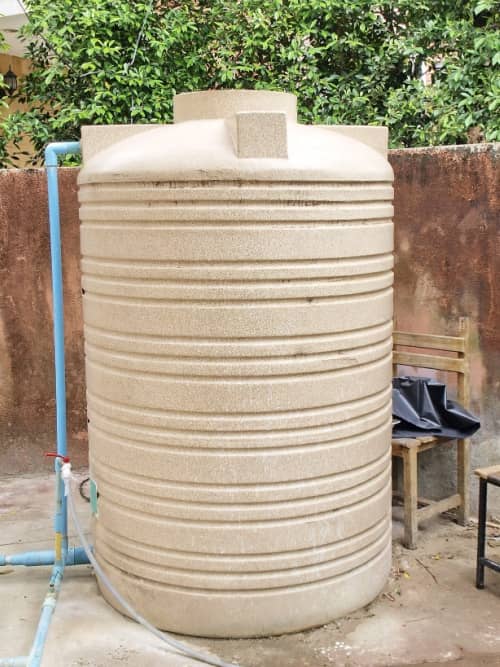
Grey water systems can be as simple as a storage tank. Just make sure not to keep the water untreated for more than 24 hours, and don’t store any if someone in your household has a contagious illness.
Separate any water taken from kitchen sinks as it will contain fats and solids that can damage your plants.
If you want to reuse your grey water, check your local council and state regulations.
For example, Victoria has policies for using treated and untreated greywater in your home.
Meanwhile, Queensland regulates where and how you can discharge greywater from your kitchen, and how you use greywater on-site.
Are These Cleaning Products Greywater Safe?
If you’re looking at other products, there are ways to check whether they’re safe for grey water.
Besides the substances listed above, here’s a quick FAQ on common household cleaners.
Is Omo greywater safe?
Surprisingly, no!
Omo products do use oxygen bleach instead of chlorine, and they contain very low amounts of phosphonates.
However, Omo bleach has unspecified enzymes which may be harmful to plants. Other products contain sodium-based ingredients.
Is Napisan greywater safe?
No, Napisan products are not safe for grey water use. Most Napisan cleaners contain sodium compounds and unspecified enzymes which could be harmful to the ecosystem.
Is vinegar greywater safe?
Only if diluted. Distilled white vinegar by itself is an acetic acid with a pH of around 2.5, which could harm gardens and soils. Diluting it reduces its strength.
If your water is very alkaline, white vinegar might also help reduce the pH to more neutral levels.
Is borax greywater safe?
Technically no, but that’s only for grey water used for gardens. Boron and sodium borate are toxic to plants in all forms.
If you do not plan to use your greywater for the yard, or your plumbing connects to a grey water system that can filter the boron, then you’ll be fine.
Is hydrogen peroxide greywater safe?
It is! Hydrogen peroxide is an oxygenated substance and will quickly break down into hydrogen and oxygen, so it’s safe for a greywater system.
However, not all oxygen-based bleaches are greywater-safe, as certain products have high salt content.

